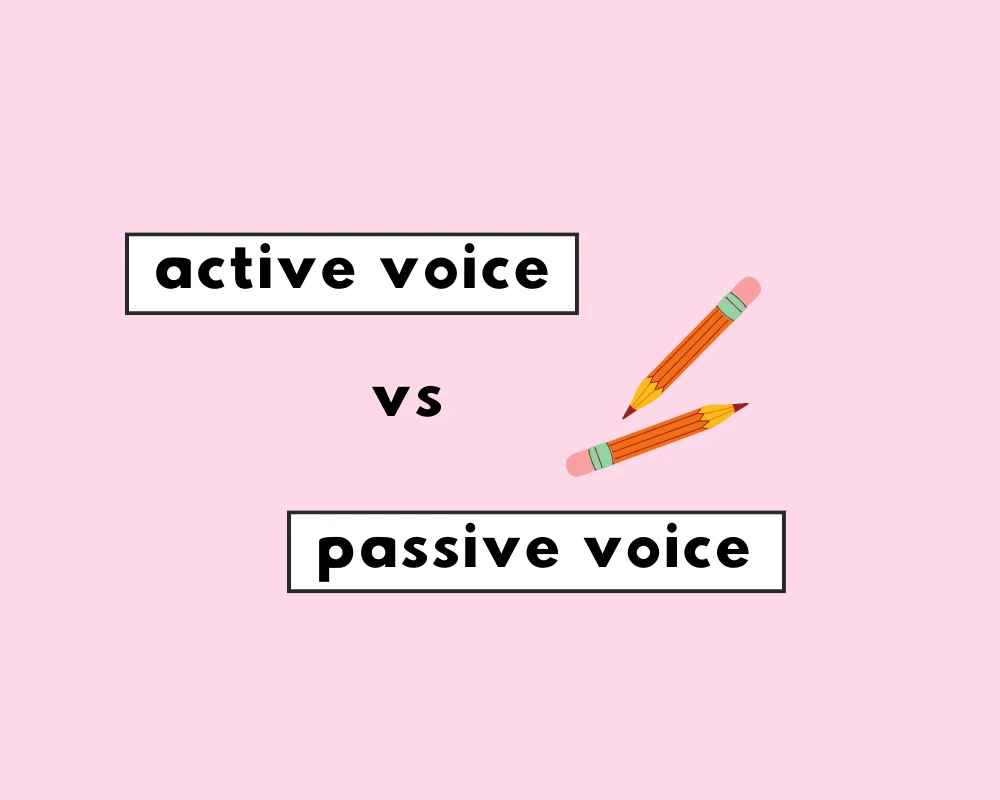Contents
Toggle
Active voice vs. passive voice
Do you drive your car or, is your car driven by you? What’s the difference in the phrasing of these questions? Technically, both ask the same thing, but the first poses the questions in the active voice; whereas the second uses the passive voice.
Active and passive voice
Compare these sentences:
Sam helps Sally. (active voice)
Sally is helped by Sam. (passive voice)
In the active voice, the subject performs the sentence’s action: Sam (subject) helps Sally. Because Sally receives the action from the subject, Sally is the sentence object.
The second sentence focuses on Sally as the action’s target or direct object of the verb. See how the passive voice flips the sentence focus to the direct object from the subject that performs the action.
So, the first sentence, where the verb shows that subject does something, is said to be in the active voice. In the second sentence, where the verb is done to something or someone by the subject, and the action is being received, uses the passive voice.
Grammar rule!
The active voice is where the sentence subject acts or performs the verb, whereas the passive voice is when the action is done to a person or thing by the subject.
The distinction is between doing something and having something being done to you/it. It’s a somewhat subtle distinction, but it’s an important lesson in grammar to understand.
Examples using the active voice
1. The cat chased the mouse.
2. She wrote a novel last year.
3. The chef is preparing a delicious meal.
4. The company launched a new product yesterday.
5. He fixed the broken window.
Examples using the passive voice
1. The mouse was chased by the cat.
2. A novel was written by her last year.
3. A delicious meal is being prepared by the chef.
4. A new product was launched by the company yesterday.
5. The broken window was fixed by him.
Sentence subject using the passive voice
When we move from the active to the passive voice, what was initially the sentence object becomes the subject by being acted upon by the verb. In other words, what receives the action in an active sentence (and is the sentence object) flips to becoming the subject of the sentence in the passive voice.
For example, in the sentence, she wrote a novel last year, the noun novel is the sentence object. If we modify the sentence to the passive voice, (i.e., a novel was written by her last year) the word novel is now the sentence subject. It follows that only sentences with transitive verbs can form the passive voice, since there needs to be a sentence object/receiver of an action to form the passive voice.
How to write in the passive voice
To create the passive voice, we use an auxiliary verb along with the past participle form of the verb, e.g., was written, was built, was fixed, etc. See the examples of sentences modified from active to passive:
Some boys were helping the wounded puppy. (active)
The wounded puppy was being helped by some boys. (passive)
The construction men are building the skyscraper. (active)
The skyscraper is being built by the construction men. (passive)
The children planted trees in the park. (active)
The trees in the park had been planted by the children. (passive)
Questions & review
Modify the sentences below from the active voice to the passive voice.
1. The dog fetched the ball.
2. She baked a cake for the party.
3. He solved the difficult math problem.
4. The artist created a stunning sculpture.
5. The mechanic repaired the car’s engine.
Modify the sentences below from the passive voice to the active voice.
1. The book was read by the entire class.
2. The cake was baked by my grandmother.
3. The movie was watched by millions of people.
4. The proposal will be reviewed by the committee.
5. The report has been written by the team.
Keep on learning!
- When to Use ‘Weren’t’ or ‘Wasn’t’? A Guide
- What’s Subject Verb Agreement? (Rules of Subject Verb Agreement)
- When to Use ‘A’ or ‘An’ (What’s an Article?)
- What is the Past Tense? (Forms of the Past Tense)
Sources
- Active and Passive Voice, High School English and Grammar Composition, P.C. Wren and Martin, 2000.










